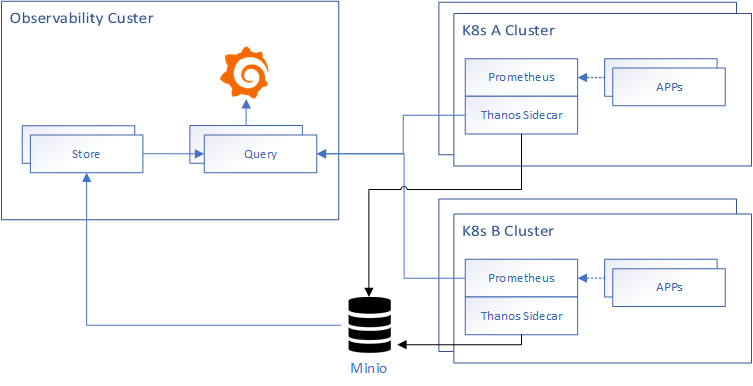如何使用 Thanos 实现 Prometheus 多集群监控
Prometheus 是 Kubernetes 中默认的监控方案,它专注于告警和收集存储最近的监控指标。但在一定的集群规模下,Prometheus 也暴露出一些问题。例如:如何以经济可靠的方式存储 PB 级别的历史数据,并且不牺牲查询时间?如何通过单一的查询接口访问到不同 Prometheus 服务器上的所有指标数据?能否以某种方式合并采集到的重复数据?针对以上的这些问题, Thanos 提供了高可用的的解决方案,并且它有着不受限制的数据存储能力。
Thanos
Thanos 基于 Prometheus。当我们以不同方式使用 Thanos 时,或多或少都会用到 Prometheus 功能,但是 Prometheus 始终是指标收集和使用本地数据进行预警功能的基础。
Thanos 使用 Prometheus 存储格式,把历史数据以相对高性价比的方式保存在对象存储里,同时兼有较快的查询速度。此外,它还能对你所有的 Prometheus 提供全局查询视图。
依据 KISS 原则和 Unix 哲学,Thanos 划分如下特定功能的组件。
- 边车组件(Sidecar):连接Prometheus,并把Prometheus暴露给查询网关(Querier/Query),以供实时查询,并且可以上传Prometheus数据给云存储,以供长期保存;
- 查询网关(Querier/Query):实现了Prometheus API,与汇集底层组件(如边车组件Sidecar,或是存储网关Store Gateway)的数据;
- 存储网关(Store Gateway):将云存储中的数据内容暴露出来;
- 压缩器(Compactor):将云存储中的数据进行压缩和下采样;
- 接收器(Receiver):从Prometheus’ remote-write WAL(Prometheus远程预写式日志)获取数据,暴露出去或者上传到云存储;
- 规则组件(Ruler):针对数据进行评估和报警;
组件之间的关系如图:

部署
在 K8S 集群中部署 Prometheus 最简单的方法是用 helm 安装 prometheus-operator。更多关于 Prometheus-operator 的内容请阅读《Prometheus-operator 介绍和配置解析 》。Prometheus-Operator 提供了高可用的支持,Thanos 边车组件(Sidecar)的注入,以及监控服务器、监控 Kubernetes 基础组件,可以监控应用所需的预制报警。
Choerodon 提供的 Prometheus-opertor 在开源社区版的基础上添加多集群监控的仪表盘。
本篇文章部署架构图如下所示:

对象存储
目前 thanos 支持大部分云厂商的对象存储服务,具体使用请参考thanos 对象存储。本文使用 minio 代替 S3 对象存储。为了方便将 minio 安装在 Observability 集群。
编写 minio 参数配置文件minio.yaml:
mode: distributed
accessKey: "AKIAIOSFODNN7EXAMPLE"
secretKey: "wJalrXUtnFEMI/K7MDENG/bPxRfiCYEXAMPLEKEY"
persistence:
enabled: true
storageClass: nfs-provisioner
ingress:
enabled: true
path: /
hosts:
- minio.example.choerodon.io
执行安装命令:
helm install c7n/minio \
-f minio.yaml \
--version 5.0.4 \
--name minio \
--namespace monitoring
登录 minio 创建一个 thanos 桶。
在每个集群中都创建一个存储secret。
- 配置文件
thanos-storage-minio.yaml。
type: s3
config:
bucket: thanos
endpoint: minio.example.choerodon.io
access_key: AKIAIOSFODNN7EXAMPLE
secret_key: wJalrXUtnFEMI/K7MDENG/bPxRfiCYEXAMPLEKEY
insecure: true
signature_version2: false
- 创建存储的 secret:
kubectl -n monitoring create secret generic thanos-objectstorage --from-file=thanos.yaml=thanos-storage-minio.yaml
Observability 集群安装 Promethues-operator
在 Observability 集群中安装的 Promethues-operator 需要安装 grafana 并且修改默认的 datasource 为 Thanos 的 Query 组件。Observability-prometheus-operator.yaml 配置文件如下:
grafana:
persistence:
enabled: true
storageClassName: nfs-provisioner
ingress:
enabled: true
hosts:
- grafana.example.choerodon.io
additionalDataSources:
- name: Prometheus
type: prometheus
url: http://thanos-querier:9090/
access: proxy
isDefault: true
sidecar:
datasources:
defaultDatasourceEnabled: false
prometheus:
retention: 12h
prometheusSpec:
externalLabels:
cluster: observe # 添加 cluster 标签区分集群
storageSpec:
volumeClaimTemplate:
spec:
storageClassName: nfs-provisioner
resources:
requests:
storage: 10Gi
thanos:
baseImage: quay.io/thanos/thanos
version: v0.10.1
objectStorageConfig:
key: thanos.yaml
name: thanos-objectstorage
安装 prometheus-operator 集群
helm install c7n/prometheus-operator \
-f Observability-prometheus-operator.yaml \
--name prometheus-operator \
--version 8.5.8 \
--namespace monitoring
A\B 集群安装 Promethues-operator
A\B 集群中就只需要安装 prometheus 相关的组件,grafana、alertmanager 等组件不再需要安装,配置文件proemtheus-operator.yaml 如下:
alertmanager:
enabled: false
grafana:
enabled: false
prometheus:
retention: 12h
prometheusSpec:
externalLabels:
cluster: a-cluster # 添加 cluster 标签区分集群
storageSpec:
volumeClaimTemplate:
spec:
storageClassName: nfs-provisioner
resources:
requests:
storage: 10Gi
thanos:
baseImage: quay.io/thanos/thanos
version: v0.10.1
objectStorageConfig:
key: thanos.yaml
name: thanos-objectstorage
安装 prometheus-operator 集群
helm install c7n/prometheus-operator \
-f prometheus-operator.yaml \
--name prometheus-operator \
--version 8.5.8 \
--namespace monitoring
为 Thanos SideCar 创建子域名分别指向集群A/B
thanos-a.example.choerodon.io
thanos-b.example.choerodon.io
以 A 集群为例创建 ingress 规则
apiVersion: v1
kind: Service
metadata:
labels:
app: prometheus
name: thanos-sidecar-a
spec:
ports:
- port: 10901
protocol: TCP
targetPort: grpc
name: grpc
nodePort: 30901
selector:
statefulset.kubernetes.io/pod-name: prometheus-prometheus-operator-prometheus-0
type: NodePort
---
apiVersion: extensions/v1beta1
kind: Ingress
metadata:
annotations:
nginx.ingress.kubernetes.io/ssl-redirect: "true"
nginx.ingress.kubernetes.io/backend-protocol: "GRPC"
labels:
app: prometheus
name: thanos-sidecar-0
spec:
rules:
- host: thanos-a.example.choerodon.io
http:
paths:
- backend:
serviceName: thanos-sidecar-a
servicePort: grpc
Observability 集群安装 thanos
使用 kube-thanos 安装 Thanos。
安装需要的软件工具:
$ yum install -y golang
$ go get github.com/jsonnet-bundler/jsonnet-bundler/cmd/jb
$ go get github.com/brancz/gojsontoyaml
$ go get github.com/google/go-jsonnet/cmd/jsonnet
使用 jsonnet-bundler 安装 kube-thanos
$ mkdir my-kube-thanos; cd my-kube-thanos
$ jb init # Creates the initial/empty `jsonnetfile.json`
# Install the kube-thanos dependency
$ jb install github.com/thanos-io/kube-thanos/jsonnet/kube-thanos@master # Creates `vendor/` & `jsonnetfile.lock.json`, and fills in `jsonnetfile.json`
更新 kube-thanos 依赖
$ jb update
创建 example.jsonnet
local k = import 'ksonnet/ksonnet.beta.4/k.libsonnet';
local sts = k.apps.v1.statefulSet;
local deployment = k.apps.v1.deployment;
local t = (import 'kube-thanos/thanos.libsonnet');
local commonConfig = {
config+:: {
local cfg = self,
namespace: 'monitoring',
version: 'v0.10.1',
image: 'quay.io/thanos/thanos:' + cfg.version,
objectStorageConfig: {
name: 'thanos-objectstorage',
key: 'thanos.yaml',
},
volumeClaimTemplate: {
spec: {
accessModes: ['ReadWriteOnce'],
storageClassName: ''
resources: {
requests: {
storage: '10Gi',
},
},
},
},
},
};
local s = t.store + t.store.withVolumeClaimTemplate + t.store.withServiceMonitor + commonConfig + {
config+:: {
name: 'thanos-store',
replicas: 1,
},
};
local q = t.query + t.query.withServiceMonitor + commonConfig + {
config+:: {
name: 'thanos-query',
replicas: 1,
stores: [
'dnssrv+_grpc._tcp.%s.%s.svc.cluster.local' % [service.metadata.name, service.metadata.namespace]
for service in [s.service]
],
replicaLabels: ['prometheus_replica', 'rule_replica'],
},
};
{ ['thanos-store-' + name]: s[name] for name in std.objectFields(s) } +
{ ['thanos-query-' + name]: q[name] for name in std.objectFields(q) }
创建 build.sh
#!/usr/bin/env bash
# This script uses arg $1 (name of *.jsonnet file to use) to generate the manifests/*.yaml files.
set -e
set -x
# only exit with zero if all commands of the pipeline exit successfully
set -o pipefail
# Make sure to start with a clean 'manifests' dir
rm -rf manifests
mkdir manifests
# optional, but we would like to generate yaml, not json
jsonnet -J vendor -m manifests "${1-example.jsonnet}" | xargs -I{} sh -c 'cat {} | gojsontoyaml > {}.yaml; rm -f {}' -- {}
# The following script generates all components, mostly used for testing
rm -rf examples/all/manifests
mkdir -p examples/all/manifests
jsonnet -J vendor -m examples/all/manifests "${1-all.jsonnet}" | xargs -I{} sh -c 'cat {} | gojsontoyaml > {}.yaml; rm -f {}' -- {}
执行以下命令创建 K8S 资源文件
$ ./build.sh example.jsonnet
对于生成的资源文件有两处需要修改
$ vim manifests/thanos-store-statefulSet.yaml
------------------------------------------------------
spec:
containers:
- args:
- store
- --data-dir=/var/thanos/store
- --grpc-address=0.0.0.0:10901
- --http-address=0.0.0.0:10902
- --objstore.config=$(OBJSTORE_CONFIG)
# - --experimental.enable-index-header # 注释掉这多余的一行
env:
$ vim manifests/thanos-query-deployment.yaml
------------------------------------------------------
containers:
- args:
- query
- --grpc-address=0.0.0.0:10901
- --http-address=0.0.0.0:9090
- --query.replica-label=prometheus_replica
- --query.replica-label=rule_replica
- --store=dnssrv+_grpc._tcp.thanos-store.monitoring.svc.cluster.local
# 添加本集群和 A/B 集群的 Store API
- --store=dnssrv+_grpc._tcp.prometheus-operated.monitoring.svc.cluster.local
- --store=dns+thanos-a.example.choerodon.io:30901
- --store=dns+thanos-b.example.choerodon.io:30901
创建 Thanos
$ kubectl create -f manifests/
通过端口转发查看 Thanos Query 是否正常
$ kubectl port-forward svc/thanos-query 9090:9090 -n monitoring

现在访问 http://grafana.example.choerodon.io 就可以查看多集群的监控信息。

总结
通过以上步骤就完成了使用 Thanos 的 Prometheus 多集群监控的安装,该方案具有长期存储的功能,并且可以查看跨集群的监控信息。
关于猪齿鱼
Choerodon 猪齿鱼作为开源多云应用敏捷全链路技术平台,是基于开源技术Kubernetes,Istio,knative,Gitlab,Spring Cloud来实现本地和云端环境的集成,实现企业多云/混合云应用环境的一致性。平台通过提供精益敏捷、持续交付、容器环境、微服务、DevOps等能力来帮助组织团队来完成软件的生命周期管理,从而更快、更频繁地交付更稳定的软件。
Choerodon 猪齿鱼v0.21已经发布,欢迎大家前来安装/升级。
安装文档:http://choerodon.io/zh/docs/installation-configuration/steps/
升级文档:http://choerodon.io/zh/docs/installation-configuration/update/0.20-to-0.21/
更加详细的内容,请参阅Release Notes和官网。
大家也可以通过以下社区途径了解猪齿鱼的最新动态、产品特性,以及参与社区贡献:
欢迎加入Choerodon猪齿鱼社区,共同为企业数字化服务打造一个开放的生态平台。
作者:易大强
出处:Choerodon
欢迎转载,但未经作者同意必须保留此段声明,且在文章页面明显位置给出原文链接。